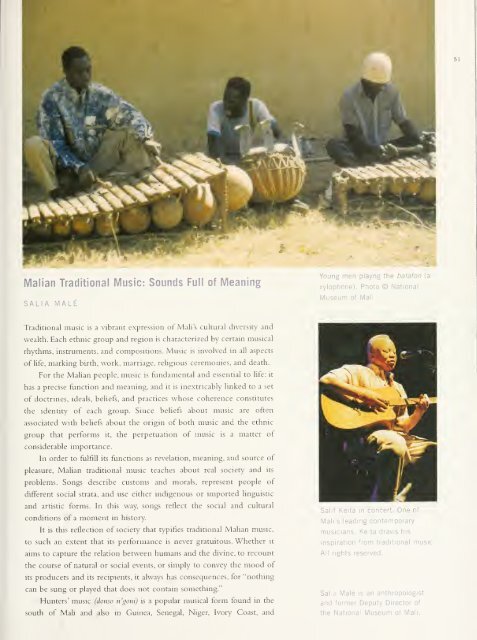SCOTLAND - Smithsonian Digital Repository - Smithsonian Institution
SCOTLAND - Smithsonian Digital Repository - Smithsonian Institution
SCOTLAND - Smithsonian Digital Repository - Smithsonian Institution
You also want an ePaper? Increase the reach of your titles
YUMPU automatically turns print PDFs into web optimized ePapers that Google loves.
Malian Traditional Music: Sounds Full of Meaning<br />
SALIA MALE<br />
Young men playng the balafon (a<br />
xylophone). Photo © National<br />
Museum of Mali<br />
Traditional music is a vibrant expression of Mali's cultural diversity and<br />
wealth. Each ethnic group and region is characterized by certain musical<br />
rhythms, instruments, and compositions. Music is involved in all aspects<br />
of life, marking birth, work, marriage, religious ceremonies, and death.<br />
For the Malian people, music is<br />
fundamental and essential to lite: it<br />
has a precise function and meaning, and it is inextricably linked to a set<br />
of doctrines, ideals, beliefs, and practices whose coherence constitutes<br />
the identity of each group. Since beliefs about music are often<br />
associated with beliefs<br />
about the origin of both music and the ethnic<br />
group that performs it, the perpetuation of music is a matter ot<br />
considerable importance.<br />
In order to fulfill its functions as revelation, meaning, and source ot<br />
pleasure, Malian traditional music teaches about real society and its<br />
problems. Songs describe customs and morals, represent people of<br />
diflferent<br />
social strata, and use either indigenous or imported linguistic<br />
and artistic forms. In this way, songs reflect the social and cultural<br />
conditions of a moment in history.<br />
It is this reflection of society that typifies traditional Malian music,<br />
to such an extent that its performance is never gratuitous. Whether it<br />
aims to capture the relation between humans and the divme, to recount<br />
the course of natural or social events, or simply to convey the mood of<br />
its producers and its recipients, it always has consequences, for "nothing<br />
can be sung or played that does not contain something."<br />
Hunters' music (donso n'goni) is a popular musical form found in the<br />
south of Mah and also in Guinea, Senegal, Niger, Ivory Coast, and<br />
Salif Keita in concert. One of<br />
Mali's leading contemporary<br />
musicians, Keita draws his<br />
inspiration from traditional music.<br />
All rights reserved.<br />
Salia Male is an anthropologist<br />
and former Deputy Director of<br />
the National Museum of Mali.
















